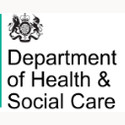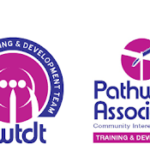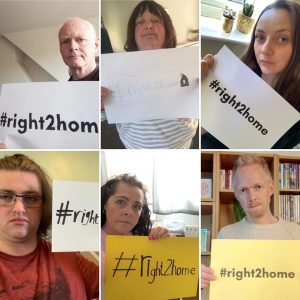Our COVID 19 grant pot is now OPEN


Our new Covid Response Funding grant pot in partnership with the Department of Health and Social Care is now open for applications.
Stronger, Louder, Together!
Wendy Burt, Scott Watkin and Jordan Smith as the Co-Chairs of Learning Disability England’s Representative Body acting on behalf of our members said;
“Understanding and properly listening to people with learning disabilities, autistic people or their families can be life-changing or life-saving so we are pleased the government has started this consultation on mandatory training.
We want to stop disabled people’s experiences being so different from non learning disabled people’s.
The training could be one part of stopping people’s experiences being so different.
We will look at the government’s ideas in detail but we are glad to see straight away that the consultation talks about changing health and social care staff attitudes and co-production in developing and delivering the training.
We will make sure LDE works with our members to know about this consultation and helps their feedback reach the Department Health and Social Care. We know that many LDE members have good practice, and evidence on what works to share as the Department asks”
The Department for Health and Social Care have started a consultation on training for health and care staff – it will be mandatory for some staff. That means they must do it as part of the training for their job.
This is happening after campaigns by families (like Oliver McGowans’) and recommendations from inquiries like the Learning From Deaths Reviews(LeDeR) programme
The consultation suggests the training covers 3 main areas:
There are questions on each chapter or the main points click here for consultation document.
The consultation is open until 12th April
You can find the easy read consultation here LINK
And full consultation here LINK
If you or your organisation are a member of Learning Disability England please do let us know if we can help you prepare a response and please do share your response so we can help bring together everyone’s ideas and main points across the membership.


Our new Covid Response Funding grant pot in partnership with the Department of Health and Social Care is now open for applications.
The National Self-Advocacy Convention

There was 320 people who attended a very full national self -advocacy convention last month that ran through from the 24th-27th February.

It has been run now as The National Self-advocacy convention for the last 2 years.
Before this it was the Northwest Self-advocacy Convention and has been held at Grand Hotel in Blackpool for 17 years.

It was very exciting for everyone who came and was 3 full days of fun. I must say it gets more interesting and fun every year.

The team who organised it were the Pathways / North West Development Team (NWDT).

The conference, you cannot fault, it was a chance for all groups to network. There was plenty of workshops and a chance to look at big issues and discuss important topics and our vision for 2030.

The conference opened with a lot of music as you approached the stage. Vicky Buckingham got people exercising in her Zumba class and then there was Dance Syndrome and Disco.

There was also a Gala night on Wednesday which had a magician doing tricks. The only negative thing I will say is I think we may be in need of a bigger venue for next year! It would be great to see the convention grow even bigger than it already has.

Lasty, well done and thank you to everyone who worked on organising the conference, those who spoke or ran workshops and of course everyone who attended. Without you this brilliant event would not be able to happen every year.
By Gary Bourlet
In October, the Solve Sleep-Ins Alliance wrote an open letter to ministers as we are worried that essential overnight social care support services are at risk. This is because the government hasn’t offered enough guidance to help people understand what to expect, or do about the decision that staff who work sleep-in shifts don’t need to be paid the national minimum wage. The letter specifically asked for an explanation about how staff should be paid for sleep-ins and how this will be funded by commissioners. You can read the full letter here.
MP Kelly Tolhurst responded to the letter. You can read her letter in full here. The letter recognised the current situation around sleep-ins as an issue. A key message being that the Department of Health and Social Care is telling local authorities and commissioners they should not be using the Court of Appeals judgement as a chance to radically change their fee-paying practices.
We know this is an issue that matter to all our members. As part of our support for the Alliance we have created a survey to collect the views of Personal Budget holders, people who use Direct Payments and families. We are interested in how the issues around sleep ins are affecting you, your family and staff; especially if funding you receive for sleep-ins has changed.
We would appreciate you taking the time to help us gather evidence to support the alliances’ work. The survey should only take a few minutes to complete.
Take part in the survey here.

Sue Sharples has used a Winston Churchill Memorial Fund grant to travel to the USA and Canada to help us all to learn their lessons around preventing abuse and promoting sexual health for people with learning disabilities.
Our work on housing choices includes hosting a post with JMS Trust that helps people set up their new home.
Find out more about JMS trust here
We are working on questions about
This includes trying to understand the numbers of unexpected deaths and incidents reported to CQC by providers and shared in the BBC file on 4 programme in February 2019.

We have written a report on what we have found out so far and are doing next
You can read the July 2019 update here
There is an easy read summary at the start of the report
There is also a blog by Kevin from L’Arche on what they changed after Joe Ulleri died in hospital. You can read that here
Thank you to all the members so far who have shared information, ideas or examples from their work
If you want to share anything or tell us what you do after things go wrong in a service or what you want to see services do please get in touch

Blog by Jayne Knight, Learning Disability England member
“REACH – constantly aspire for better” Reflections on Supported Living today
#right2home is a campaign to keep the Whorlton Hall scandal on the political agenda, and press the government to act on its promises.
It is led by self advocates and family campaigners.
We know that more than 2,000 adults and children are still in secure mental health units.
Since the coronavirus lockdown started, people in secure units may not have seen advocates or family carers. We are worried about their welfare.

The campaign is building up to 5 days of action on from 18th to 22nd May, – they want people to join in
Building on earlier campaigns, #right2home is co-run by people with learning disabilities and campaigners.
You can read more about the campaign here
Learning Disability England is supporting the campaign
You can follow the campaign on twitter and facebook:
https://www.facebook.com/right2homeUK/
Universal Credit

Universal Credit affects learning disabled people more than other groups of people. We’ve been worried that people with learning disabilities haven’t been included when talking about those effects.
We’ve been talking to members about how universal credit has affected them.
We’ve started working with others to make sure people voices are heard and support is accessible and inclusive.
You can read our full report here.
Sleep in payments
We have started this work as part of the #Solvesleepins Alliance
#SolveSleepIns September 2019 Update
HMRC Sleep-in Guidance
HMRC have made this 10 minute webinar offering guidance on the rate of pay given to staff who work sleep-in shifts. The webinar
The Supreme Court is allowing the trade union, Unison, to appeal the Court of Appeals decision about sleep-ins.
This means that the Supreme Court will now look at the case.
The Supreme Court is the highest Court of Appeal in the UK. They make decisions about how the law works in cases where the law is currently unclear.
The decision they make must be used by all other courts.
To have a case heard at the Supreme Court it must be heard at the other levels of Court first. Only cases that are very important to the public go are heard.
The sleep-ins case is about whether support staff should be paid the National Minimum Wage during overnight shifts when they aren’t always working.
It is seen as very important to the public because a decision that staff should be paid the National Minimum Wage for the whole sleep-in shift would have a huge effect on the social care sector. It might mean the sector has to pay around £400 million in back pay to staff. This might bankrupt some organisations. It also is an important message on how support staff are valued for the work they do so many people want a solution that keeps good reliable staff doing their jobs.
For more information about the case and previous decisions, click here.
The 12th and 13th February 2020 have been set as the dates for the appeal. It is expected the Court will make a decision by July 2020.
Sleep-Ins effecting Members
Some members have been telling us about changes their providers have tried to make to wages for sleep-ins.
One family told us about their provider trying to reduce staffs sleep-in pay despite the local authority committing to not reducing rates. They have challenged the provider on this as they think its unreasonable and unfair for staff to take a pay cut.
If you have been effected by issues around sleep ins and would like to share your experiences, you can contact Rachael on rachael.hall@ldengland.org.uk
Want more choice and control over your support without the complications of Direct Payments? An Individual Service Fund may be the answer!
Watch to hear about how people are starting to use Individual Service Funds in England to have more choice and control over their support.
ISFs are a type of personal budget that can offer nearly the same amount of choice and control as a Direct Payment but without some of the complications.
They were introduced in England through the Care Act 2014, as a promoted option for local authorities to be able to commission this form of self-directed support.
Since then, several pilots have taken place around England to trial ISFs and to ‘test and learn’ more about how they work and the benefits for people using them.
In this webinar you will hear from Chris Watson, Founder of Self Directed Futures, Jacqui Hendra, a social care assessor who works with ISF’s in Devon and Gary Kent who runs a support provider organisation called New Key.
The webinar covers:
• What ISFs are
• What are their benefits and why they are different to Direct Payments
• What your rights are and what is happening with them around England
• Gary and Jacqui’s work together supporting people with ISFs in Devon
• Trudy’s real life ISF story
• Question and answer session with all speakers
For more information about the webinar and resources about ISF, click here
This webinar will be of particular interest to families, support providers and those working for local authorities.
This was a members only webinar. It was open to individual members and people who are part of organisations who are members. You can join as a member for as little as £12 a year, find out more here